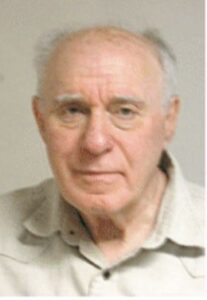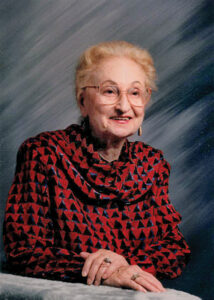
I have long had a fascination with the paranormal – ever since coming across writings related to Edgar Cayce and The Sleeping Prophet when I was still a teenager. I have also over the years read stories of others who foresaw the future or exhibited abilities that were beyond normal. And during the course of my career, I have had the opportunity to interview some who exhibited paranormal, or psychic, ability.
One such individual was astrologer Martha Frohlinger. The first and only time I interviewed Martha was in the late 1980s. Martha was the only astrologer I have ever written about.
According to the Manitoba Historical Society’s listing of “Memorable Manitobans”, Martha taught beginner and advanced classes in astrology, founded the Manitoba Astrology Association, hosted a weekly astrology program on Shaw Cable, and was inducted into the Astrology Hall of Fame.
“I think that what made Mom a really good astrologer was her passion for people,” her son, Tom, comments. “She was very good at reading people. She could tell a lot about you that you might have known about yourself.”
At the time I interviewed Martha, we didn’t get into her past. I knew she had come to Canada as a Hungarian Jewish refugee in 1956. But, in a conversation with her son for an article in the Jewish Post last year, I learned that her life had taken many twists and turns as she continually reinvented herself.

The most amazing part of her story, Tom recounted, is how she survived the Holocaust by hiding in plain sight by pretending to be the wife of a high-ranking Hungarian Nazi who was actually sympathetic to the Jews. She was able to use her disguise with the knowledge of her pretend husband to save the lives of her daughter, Agnes, and several family members as well as many other endangered Hungarian Jews.
According to Tom, his mother grew up in Budapest, along with her younger brothers, in an upper middle class secular Jewish family. Their father was from Vienna, their mother from Budapest. Their parents operated a business buying and selling high end petit point textiles for the European market.
Martha, at a relatively early age, married Sandor Gordon in 1936 and, in 1939, with their then two-year-old their daughter, Agnes, the young couple moved to Paris. They moved back to Budapest a couple of years later.
“It was becoming very difficult for Jews in Hungary by the early 1940s,” says Tom Frohlinger who was born after the war’s end. “My grandfather sent his oldest son to England where he had a lot of contacts through his business. Mom and her other brother remained in Budapest and helped run the business.”
In 1943. Sandor Gordon, Tom’s birth father, was conscripted into the Hungarian army’s forced labour battalion and sent to the Russian front. He ended up in a Russian POW camp. In Budapest, the family was forced to sell the business and were ordered to move into the Jewish ghetto. Instead, Martha, her daughter and her parents went into hiding. Her brother in Budapest disappeared some time in 1944.
Tom doesn’t know exactly how his mother became connected with the Hungarian official, but she and Agnes moved in with him, living in a villa in Buda with enough room to hide her parents and other relatives.
“Because rationing was in effect,” he notes, “it was difficult to feed nine people on rations for three. I am sure that my mother turned to the black market. She was very resourceful, quite good at looking after the needs of her family.”
He goes on to add that because Martha was thought to be the wife of an important government official that she enjoyed carte blanche to go in and out of the ghetto at will and consequently was therefore involved in helping many Jews to get the Wallenberg visas which saved their lives.
Tom doesn’t know the name of the Hungarian official but does report that he heard that the man left Hungary at the time of the 1956 Hungarian Revolution and believes that died in Argentina in the mid-1960s.
In 1945, Sandor came back from the prison camp and rejoined his family. The reunited couple opened a haberdashery store in Budapest.
In 1948, following the Communist takeover of Hungary, Tom’s maternal grandparents moved first to Israel and later to Vienna. By 1951, the Communists had taken full control and nationalized everything. “Dad retrained as a millwright while mom became a housewife,” he says.
Sandor Gordon died in November 1956, at the height of the Hungarian Revolution. Despite her personal tragedy, Martha again swung into action.
“Mom was an enterprising woman who was able to adapt quickly and still had some political connections,” he notes. “The border with Austria was open for just two or three weeks – but the border was mined. People fleeing Hungary still needed guides to get them through the mine fields and safely into Austria. Mom helped a lot of people get out. I remember many relatives, friends and strangers stopping by our apartment in Budapest to get the details of the routing arrangements and say good-bye.”
The next year, it was the turn of Martha and Tom to leave. “Mom used her connections to get us passports for the two of us to go to Vienna,” Tom recalls. “It was almost unheard of at that time for anyone to be allowed to leave the country. We left Hungary in early September 1957 and sought and were granted asylum in Austria.”
Knowing that she would need to find a way to support herself no matter where she might end up, Tom recounts, his mother trained in Vienna to be a hairdresser. It was also at that time that she began to seriously pursue her growing interest in astrology studying with a well-known Viennese astrologist.
Martha, with young son, Tom, in tow, came to Montreal as a refugee in 1958. Her brother, David, was already in Montreal. Martha promptly got a job working in a hair salon and, Tom notes, within a few months, she owned the business.
In 1962, she added “farm wife” to her growing resume when she married fellow Hungarian Jewish refugee Louis Frohlinger. “Mom felt that I was at the age where I needed a strong father figure,” Tom observes.
Louis Frohlinger was among a small number of Hungarian Jewish farmers who immigrated to Canada after the war and settled in the Hamilton-Niagara area, among them Louis’ friends and a cousin from Hungary.
“Louis was a great father,” Tom says. “He taught me the importance of having a moral compass and strong work ethic.”
While Louis and Tom farmed, the ever-enterprising Martha opened a hair salon in a nearby community.
She came to Winnipeg in 1975 after Tom had moved here, with Louis following later after selling the farm. It was only after coming to Winnipeg that Martha became a professional astrology and a leader in the field in Winnipeg.
Martha Frohlinger passed away about 20 years ago at the age of 89.


